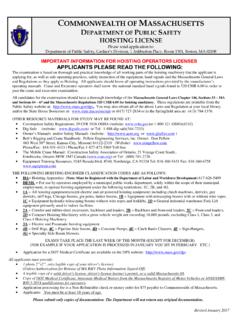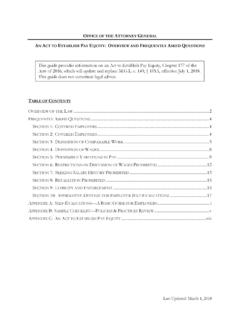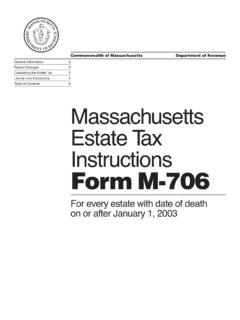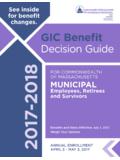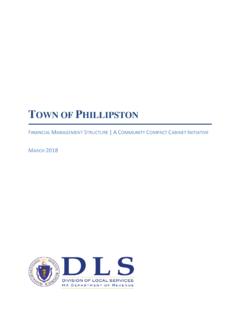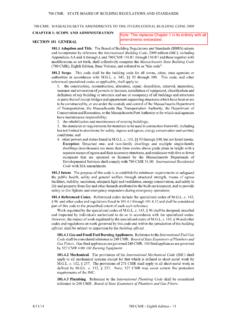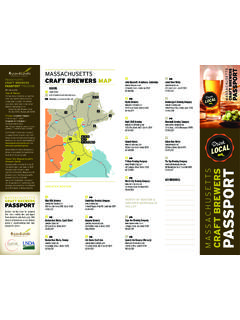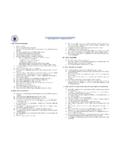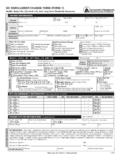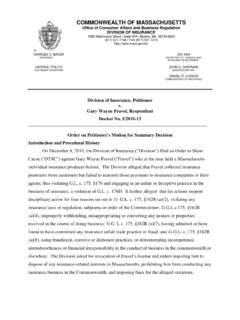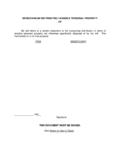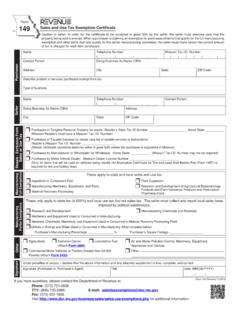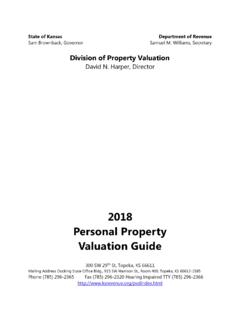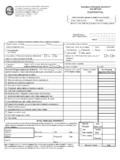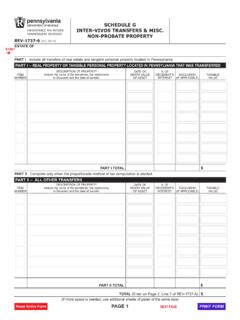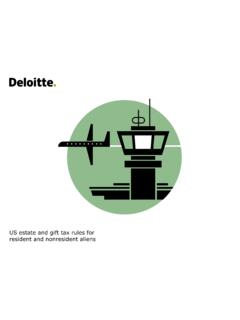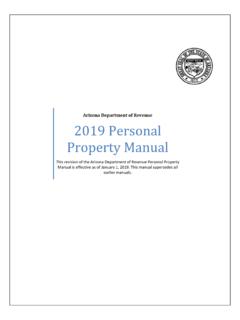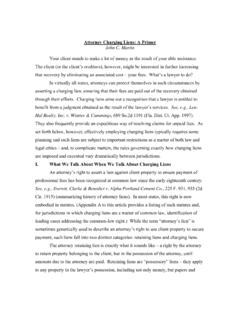Transcription of PERSONAL PROPERTY FREQUENTLY ASKED QUESTIONS (FAQS)
1 1 Bureau of Municipal Finance Law Revised March 2019 PERSONAL PROPERTY FREQUENTLY ASKED QUESTIONS (FAQS) FAQs on Local Taxation of PERSONAL PROPERTY FREQUENTLY ASKED QUESTIONS (FAQs) published by the Division of Local Services (DLS) within the Department of Revenue provide general information about Massachusetts municipal tax and finance laws and DLS policies and procedures in effect when published. They do not answer all QUESTIONS or address complex issues about their topics. FAQs are not public written statements of the Department. They are informational only as described in 830 CMR (10)(c), and do not supersede, alter or otherwise change any Massachusetts General Law, Department public written statement or other source of law.
2 PERSONAL PROPERTY Taxation FAQs 1. Do cities and towns in Massachusetts assess a PERSONAL PROPERTY tax? Yes. The assessors in each city and town assess PERSONAL PROPERTY taxes on all taxable PERSONAL PROPERTY situated within their communities. Although PERSONAL PROPERTY is generally taxable, there are a number of exemptions that apply based on specific factors, including the entity status of the owner, type of PROPERTY and use of the PROPERTY . The tax is calculated by multiplying the assessed value of the PROPERTY by the PERSONAL PROPERTY tax rate of the city or town.
3 PERSONAL PROPERTY is assessed separately from real estate where it is located. A single PERSONAL PROPERTY assessment is made for all taxable PERSONAL PROPERTY of the owner located in the city or town. 2. What is considered PERSONAL PROPERTY for local PROPERTY tax purposes? PERSONAL PROPERTY generally includes tangible items that are not firmly attached to land or buildings and are not specially designed for or of such a size and bulk to be considered part of the real estate. This includes, for example, merchandise, furniture, machinery, tools, animals and equipment.
4 PERSONAL PROPERTY is taxable unless a specific exemption provision applies. c. 59, 2. 3. What PERSONAL PROPERTY is subject to local taxation? All PERSONAL PROPERTY situated in Massachusetts is subject to tax, unless specifically exempt by law. c. 59, 2. PROPERTY is situated in a particular city or town in the Massachusetts if it is present on January 1 with the owner's intention that it remain with some degree of permanence. PROPERTY that is FREQUENTLY moved from place to place or intended for use temporarily at different places is considered situated where the owner resides or has a principal place of business (if the PROPERTY is business PERSONAL PROPERTY ).
5 An example of exempt PROPERTY involves household furnishings and effects. Household PERSONAL PROPERTY at a person's domicile (primary residence) is exempt from PERSONAL PROPERTY tax. c. 59, 5, Clause 20. However, household PERSONAL PROPERTY located at other residences is taxable. 2 4. Which municipality assesses the tax? The city or town in which the PROPERTY is situated on January 1 assesses the PERSONAL PROPERTY tax. If the PROPERTY has established no particular situs, the tax is assessed by the city or town in which the owner resides (or has a principal place of business for business PERSONAL PROPERTY ).
6 C. 59, 18. 5. To whom is the tax assessed? The owner of the PROPERTY on the January 1 before the fiscal year begins is generally the person or entity assessed the tax. c. 59, 18. An exception exists for machinery or tangible PERSONAL PROPERTY leased for profit. In that case, the tax may be assessed to the person in possession instead. PERSONAL PROPERTY of a deceased owner whose death is of record is assessed to the decedent s heirs and devisees and after appointment, to the PERSONAL representative of the estate. Jointly owned PROPERTY may be assessed to one or more of the owners.
7 Partnership PROPERTY is assessed to the partnership, not any of the partners. PERSONAL PROPERTY of a limited liability company (LLC) is assessed to the LLC. PERSONAL PROPERTY Tax Exemption FAQs 6. What PROPERTY is exempt from PERSONAL PROPERTY tax? Several exemptions from PERSONAL PROPERTY tax may apply depending on a number of factors, including the legal form of the owner, , the entity that owns the PROPERTY , the type of PROPERTY , and in some cases the use of the PROPERTY . Most of the exemptions are set forth in several clauses of c.
8 59, 5. See, , Clause Sixteen. Other exemptions may be found in other statutes and special acts. In some cases the exemptions from PERSONAL PROPERTY tax are offset by another form of exaction, an excise or fee. For example, an exemption for non-commercial airplanes paying a state regulatory fee appears in c. 90, 49(b). A good explanation of what PERSONAL PROPERTY is taxable based on the form of ownership (individual, partnership, unincorporated entity or corporation) may be found in Part 3 of the PERSONAL PROPERTY return, known as the Form of List or State Tax Form 2.
9 7. Is PERSONAL PROPERTY in the nature of construction works in progress ( CWIP ) or not in service taxable? Yes if the owner is otherwise taxable for that type of PROPERTY . For example, corporations are taxable on their networks of poles, underground conduits, wires and pipes and machinery used in the conduct of business. Underground conduits, wires and pipes, as well as the poles with wires attached are taxable if laid or erected and connected to or capable of connection to be part of "one great integral machine." Boston Gas Co. v. Assessors of Boston, 334 Mass, 549, 565 (1956).
10 See also c. 59, 18, Clause Fifth. Moreover, the machinery is likewise subject to tax if connected or capable of being hooked up to the system. There is no requirement that such PROPERTY be "in service" in order to be taxable. See Verizon New England, Inc. v. Assessors of Boston, 81 Mass. App. Ct. 444, 455 (2012)..Accord Hamilton Manufacturing Co. v. Lowell, 274 Mass. 477,485-86 (1931) (machinery not in service nevertheless taxable where it was still "well adapted ..for the purpose for which it was designed.") 8. What PERSONAL PROPERTY tax exemptions apply generally to all taxpayers, regardless of the form of entity of the owner?
